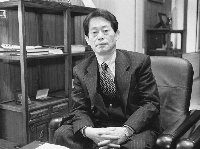Kang Keun-tek: "Fearing foreign investment is an obsolete stereotype"

The Day: Ukraine is considered (with reason) a high risk area for foreign investment. South Korean companies, nonetheless, seem to take the lead among East Asian investors. What exactly attracts them to this country so much they are willing to take the risks?
Ambassador: There are a number of reasons and yes, the risk is high. But there is your labor pool in the first place. Your people are highly skilled and well educated. Compared to other European countries, your work force is inexpensive. There are rich natural resources in Ukraine, along with advanced technologies and fundamental sciences. Ukraine is geographically on the crossroads linking Asia and Europe, which is also important. From the point of view of long-term cooperation, Ukraine is very attractive, especially in such strategic sectors as construction, machine-building, and electronics.
The Day: How will the economic crisis in the Pacific region affect Ukrainian-Korean cooperation? Is it possible to talk about a way out of this crisis yet?
Ambassador: We have a joint venture in Zaporizhzhia, AvtoZAZ-Daewoo. It is operational, but there are sale problems precisely because of the crisis. These problem will disappear once there is economic growth. Even if the crisis has a negative impact on our cooperation this does not mean that Korea will let it slow. We have embarked on this road and will proceed in this direction. We are not going to cancel any arrangements made previously.
There is good news from Korea. The crisis broke out in November 1997 and we had to do some restructuring in the financial domain, also in the corporate and public sectors. Already at the turn of this year positive changes were registered statistically. Well-grounded forecasts show that we will come out of the crisis in the first half of 1999 and there will be economic growth in the second half of the year. Prestigious economic institutions predict 1-2% economic growth in Korea.
In 1997, the balance of trade amounted to $15 billion, meaning we were in the red. Last year it reached $40 billion, meaning export balance of trade. Toward the end of 1997 our foreign exchange reserves were $8.9 billion. Today, it is $45 billion. The IMF, World Bank, and other international financial institutions have praised Korea for its economic reforms, stating that it coped with the task better than all the other countries.
The Day: After last year's nuclear tests in India, North Korea announced it would renew its nuclear program frozen since 1994. How did Seoul take this?
Ambassador: International law and UN documents forbid any programs aimed at developing and manufacturing weapons of mass destruction. The fact that North Korea is proceeding with its nuclear program is a threat to stability and peace on the Korean peninsula and the rest of the region, so neighboring countries will have to take measures to prevent this danger. China, the United States, Japan, and Russia demanded that North Korea stop this program. In 1994, North Korea agreed to freeze it. In return, Japan, the US, and South Korea undertook to build two nuclear power stations using light water. In the end North Korea would always try to get money from the international community, using this problem as a lever in negotiations and lobbying its interests.
Current satellite intelligence shows that there is an underground tunnel in North Korea and that work is underway there, probably an attempt to develop its nuclear program. The United States, Japan, and South Korea wanted to send inspectors to North Korea, but it declined. The latest reports say it wants $300 million to allow such inspections. We consider that North Korea must abide by the agreement signed in 1994, so we will continue to pressure it using diplomatic means.
Despite all political differences, we try to develop economic cooperation
with North Korea, including various exchanges, but it does not want to
meet us halfway.
Випуск газети №:
№8, (1999)Рубрика
Day After Day





